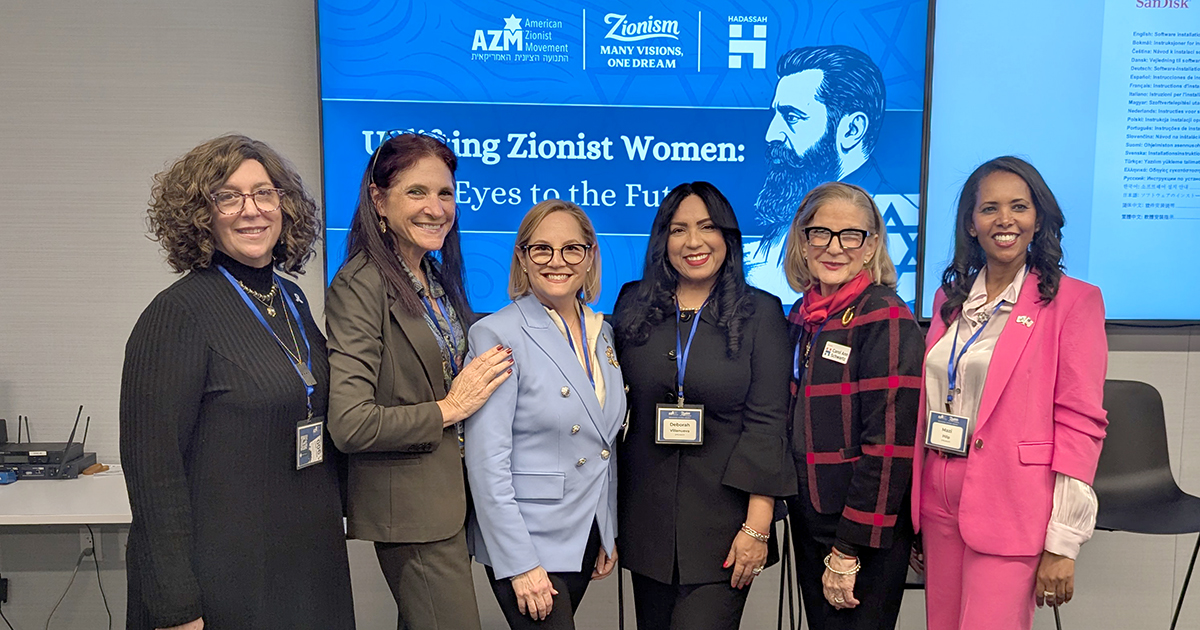In the past two weeks at Hadassah Neurim Youth Aliyah Village, two former students were killed and a staff member lost a son in the Hamas massacre. The week of shiva (mourning period for the dead) was held in the village. Currently, 30 staff have family members serving in the Israel Defense Forces.
Through all of this, the village has tried to create an atmosphere of business almost as normal for the 50 students at the village. Most of the students have gone home, but those whose parents aren’t in Israel, predominantly those from former Soviet countries, have stayed. They have been joined by some 60 students and 30 staff and their families, who moved from Kfar Silver, near heavily bombed Ashkelon.
“We’re pretty much halfway between Gaza and Lebanon, and so far, thankfully, there’ve been no sirens here,” explains Hadassah Neurim spokeswoman Shiri Wallerstein.
Six village students sit around a large, square conference table in the management offices, keen to tell their stories to Hadassah members and supporters.
“I was a serious gamer. I never went out, never had friends. I hated my life,” says Adam Sarousi, 16, from Petah Tikvah and the only Israeli-born sabra in the room. “But coming here has changed everything. There’s nutritious food. Finally, I’m the right weight. I have a gym. I have friends.”
It’s shifts like Adam’s and his peers’ that have given them the capacity to cope with the new situation they found themselves in on the morning of October 7.
Four of the group are from Ukraine and only moved to Israel after the outbreak of fighting back home. Their parents, as with those of most of the other students from eastern Europe, asked if they wanted to go home, or even leave for a third country. The resounding answer from this group was, “Hadassah Neurim is safe. I feel at home here.”
While classes only recently resumed and are presently virtual because the Israeli students are spread around the country with their families, the idea is to increase the number of study hours and then bring the students back one grade at a time.
Lera Komanko, 15, was with her adoptive family in Shoham, near Ben Gurion Airport, when fighting erupted.
“I knew I wanted to be in the safety of the village,” says Lera, a bronze medalist in the national hammer-throwing championships in her age group. A staff member drove to Shoham to pick her up.
Back in Ukraine, Lera saw Russian planes flying overhead and rockets landing in her city, Vinnytsia.
“We have psychosocial services available for all the village’s population,” says Wallerstein.
The village is also running many of its afternoon programs, even though much of the student population is back at home.
For Timor Komanko, 15, also from Vinnytsia, that programming is crucial for his mental well-being.
“Getting to the gym, doing physical exercise is so important,” he says. “It takes me away from my concerns.”
Arseny Yasvoin, 15, is from near Kyiv. He moved to Hadassah Neurim with his twin sister.
“We’re close, but now she has her friends and I have mine,” he says, as his friends give a knowing smile. “I’ve been speaking with my parents every day since the war started. I just explain how quiet, peaceful it is here.”
The last two young men in the room have their hearts set on joining the Israel Defense Forces. Asked if they are thinking twice about that in light of ongoing events, both puff out their chests and offer resolute shakes of their heads.
Says Danilo Monosov, 16, also from Vinnytsia, “I’m about to take the test to be accepted into the military-fitness training program. I want to be in the IDF for eight to 10 years, in the Navy Seals.”
Two years older, Vcevold Spytsyn, is waiting to hear if the army will accept him for his dream role in cyber security. His role as captain of Hadassah Neurim’s FIRST (For Inspiration and Recognition of Science and Technology) robotics team should stand him in good stead.
“I arrived in the middle of the night at the airport, and when I got to the village, I was immediately put into quarantine because of the pandemic,” Vcevold continues. “Three weeks later, the door opened. I looked around and just said ‘wow.’ Now, I’m truly part of Israeli society and I want to serve my country more than ever.”
Perhaps even more remarkably, just 18 months ago, Timor had no idea he was Jewish. With the start of the war, his mother explained his heritage and told him there was a way to escape the fighting in Ukraine. “In just a year, I know what it means to be Jewish—not Orthodox —but I know that here in Israel and at Hadassah Neurim I am home.”



.svg)






